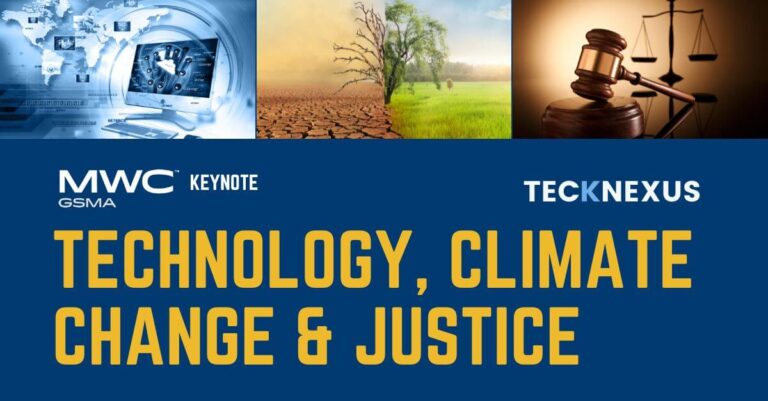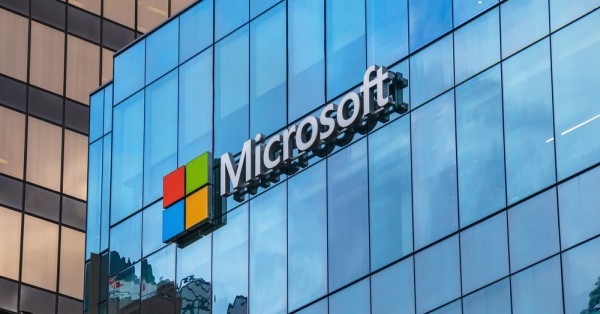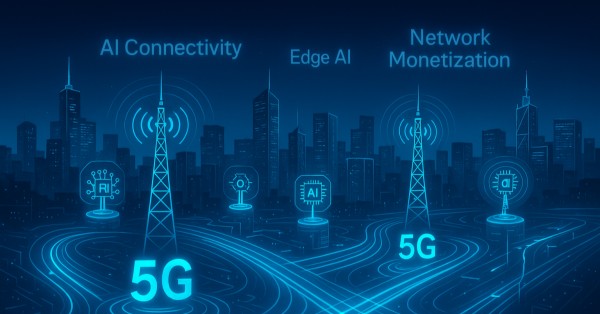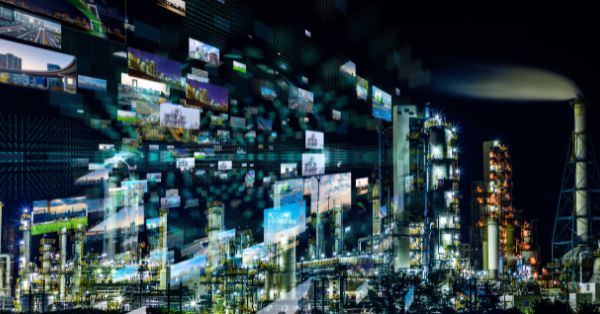Technology & Climate Action: The Role of Innovation in a Sustainable Future
As climate change continues to define our era, businesses, policymakers, and innovators must align their efforts to address this global crisis. From artificial intelligence‘s growing energy demands to leadership best practices, sustainable transformation requires urgency, leadership, and collective responsibility. The recent discussions at the Mobile World Congress (MWC) provided valuable insights into how technology can be harnessed as a force for good and how businesses must embed sustainability at their core.
Two key sessions—“Climate Change and Leadership: Inspiring Urgency in Business” and “AI Eats the World”—explored the intersection of innovation, responsibility, and sustainability. The “Climate Change and Leadership” fireside chat featured Leah Seligmann, CEO of The B Team, and was moderated by Oliver Balch, Journalist. It examined how businesses can challenge the status quo, rethink practices, and make sustainability a core value.
The “AI Eats the World” panel, moderated by David Rowan, Founding Editor-in-Chief of WIRED UK, tackled the growing energy demands of artificial intelligence and its implications for global electricity consumption. Panelists included Ami Badani (CMO, Arm), Anna Borg (CEO, Vattenfall), and Peter Sarlin (Co-founder and CVP, AMD Silo AI), who discussed how next-generation computing infrastructure must prioritize energy efficiency while enabling AI’s continued expansion.
These sessions emphasized that addressing climate change should be at the forefront of every business agenda, and that technology, when leveraged responsibly, can be a key driver of sustainable progress.
Climate Change & Business: Why Urgent Action is Essential
The world faces an escalating climate crisis, marked by rising temperatures, increasing natural disasters, and growing economic and social inequality. The UN has acknowledged that we are on track to exceed the 1.5-degree Celsius warming limit set by the Paris Agreement. Despite these alarming trends, the conversation at MWC was not about despair but solutions. The focus was on leveraging technology to mitigate climate change, transform industries, and create a just transition.
In a fireside chat moderated by journalist Oliver Balch, Leah Seligmann emphasized that sustainable leadership is both essential and challenging. It requires businesses to rethink conventional models, prioritize long-term resilience over short-term profit, and integrate sustainability into every aspect of decision-making. Leaders must act swiftly, balancing financial imperatives with investments in sustainable technologies.
How Businesses Can Lead the Fight Against Climate Change
The discussion also highlighted the need for a shift from shareholder capitalism to stakeholder capitalism—an economic model where businesses consider their impact on all stakeholders, including employees, customers, and the planet. Companies such as IKEA and Salesforce, which are part of The B Team, exemplify this shift by embedding sustainability into their corporate strategies. They have successfully demonstrated that reducing carbon footprints does not come at the cost of profitability.
Leaders must challenge the status quo, engage in collaborative efforts, and be transparent about their sustainability efforts. One of the biggest hurdles in implementing sustainable leadership is the resistance to change. Many industries, particularly in the energy sector, still rely on fossil fuels. However, as Seligmann pointed out, businesses can thrive by aligning their strategies with environmental responsibility. Companies that fail to act on climate change risk losing both consumer trust and long-term viability.
AI’s Growing Energy Demands: Balancing Innovation and Sustainability
As AI becomes an integral part of modern society, its energy demands are rapidly increasing. The “AI Eats the World” panel, moderated by David Rowan, addressed the pressing concern of AI’s impact on global electricity consumption. The speakers—Ami Badani (CMO, Arm), Anna Borg (CEO, Vattenfall), and Peter Sarlin (Co-founder and CVP, AMD Silo AI)—discussed how the next generation of computing infrastructure must prioritize energy efficiency.
AI models, particularly large-scale language models, consume vast amounts of energy. For example, training a model like GPT-3 requires significant power, and its successors demand even more computational resources. The energy footprint of AI raises concerns about sustainability, particularly as companies seek to scale these models across industries. The panelists emphasized that while AI is a transformative force, its development must be balanced with responsible energy use.
Building a Greener AI: Strategies for Energy-Efficient Computing
Optimizing AI’s energy efficiency involves a multi-faceted approach. Key strategies discussed in the panel included:
- Hardware Innovations: Companies like Arm are developing energy-efficient processors to reduce the power consumption of AI workloads. Chip advancements and optimization techniques can lead to significant energy savings.
- Software Efficiency: AI models can be made more sustainable by improving algorithms, reducing redundant computations, and implementing more efficient data management strategies.
- Renewable Energy Integration: AI data centers must transition to renewable energy sources. Companies like Vattenfall are already powering data centers with fossil-free electricity, using a combination of wind and hydro energy.
- Collaboration Across Industries: The panelists highlighted the need for cross-sector collaboration, where businesses, governments, and researchers work together to create sustainable AI infrastructure.
The urgency of addressing AI’s energy consumption is clear. While current AI applications account for a small percentage of global electricity usage, the rapid adoption of AI across industries means that its energy impact will only grow. By implementing energy-efficient computing solutions and integrating AI with renewable energy, businesses can harness its potential without exacerbating climate change.
The Path Forward: Leadership, Responsibility, and Collaboration
The discussions at MWC underscored the importance of responsible leadership in tackling climate change and ensuring that technology is used as a force for good. Sustainable leadership is not just about setting ambitious goals but about taking concrete actions to achieve them.
Key takeaways from the sessions include:
- Leaders Must Lead by Example: Businesses need visionary leaders who are committed to sustainability and willing to make bold decisions.
- Urgency is Non-Negotiable: Climate change is happening now, and delayed action will only increase the cost of adaptation.
- Collaboration is Key: The private sector, governments, and civil society must work together to create policies, share best practices, and invest in green technologies.
- Technology Must Be Part of the Solution: While AI and digital transformation can contribute to climate challenges, they also offer powerful tools to combat them.
The optimism expressed by the panelists was clear: while challenges exist, solutions are within reach. Businesses that prioritize sustainability will not only help fight climate change but will also position themselves as industry leaders in an increasingly eco-conscious market.
Technology, Climate, and Justice: The Future of Sustainable Innovation
The intersection of technology, climate change, and justice is where the future of business must be shaped. As the MWC discussions revealed, there is an urgent need for leadership that embraces sustainability as a core business strategy. AI’s growing energy demands present both challenges and opportunities, and innovation must align with environmental responsibility.
The corporate world has a choice—continue with business as usual or become a driving force for positive change. The time for action is now, and businesses that recognize the urgency of this moment will be the ones that thrive in the future. By combining innovation with sustainability, we can create a world where technology serves both people and the planet.
Session Moderators
David Rowan | WIRED UK, Founding Editor-in-Chief
Oliver Balch | Freelance, Journalist
Session Speakers
Leah Seligmann | The B Team, CEO
Anna Borg | Vattenfall AB, CEO
Peter Sarlin | AMD Silo AI, Co-founder and CVP



























